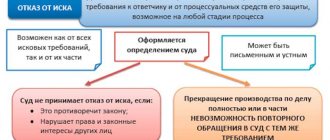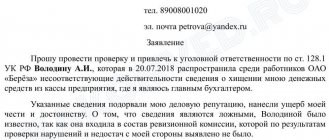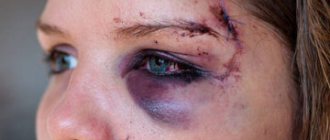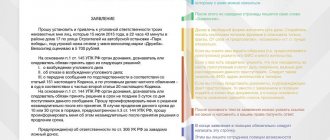Many people decide to take it back after filing a police report. Many people ask a question related to whether it is possible to take away a written and submitted statement from the police station.
If the crime did not take place at all, then you cannot wait, but you must apply on the same day to withdraw the written appeal.
By submitting a written appeal, each citizen assumes some responsibility for this step. If you approach this procedure correctly, then no liability will follow.
○ Grounds for withdrawal of application
It would be correct to talk not about withdrawing a previously submitted application, but about filing a new one, with the aim of canceling the previous one. According to Article 140 of the Code of Civil Procedure of the Russian Federation , a statement is a reason to initiate a criminal case. In accordance with Article 141 of the Code of Civil Procedure :
1. A statement about a crime can be made orally or in writing.
2. The written statement of the crime must be signed by the applicant.
3. An oral statement about a crime is entered into the protocol, which is signed by the applicant and the person who accepted this statement. The protocol must contain information about the applicant, as well as documents identifying the applicant.
4. If an oral report of a crime is made during an investigative action or during a trial, then it is entered, respectively, in the protocol of the investigative action or the protocol of the court session.
5. In the event that the applicant cannot be personally present when the protocol is drawn up, his application is drawn up in the manner established by Article 143 of this Code.
6. The applicant is warned of criminal liability for knowingly false denunciation in accordance with Article 306 of the Criminal Code of the Russian Federation, about which a note is made in the protocol, which is certified by the applicant’s signature.”
Each application goes through the prescribed registration procedure. Therefore, it is impossible to go and say that I want to take my application back.
If it is registered, the information contained in it must be verified and a decision will be made on it:
- On the initiation of a criminal case.
- Refusal to initiate a case.
Thus, in terms of withdrawing an application, one should only say that it is possible to submit a new application, in which a request is made not to initiate proceedings on the original application. And this could happen in the following cases:
- If reconciliation has been reached with the person in respect of whom the question of bringing him to justice was raised.
- If it turns out that the person who was accused of committing an offense is not guilty or the event of the offense itself did not occur.
✔ The guilty person made amends
The law allows the termination of a criminal case or refusal to initiate it if, by the time the decision is made, the applicant and the guilty person have reached reconciliation:
- An apology was made.
- The damage caused has been compensated.
However, in order for the second statement of the absence of claims made in the primary document to be taken into account, the following conditions are necessary:
- The crime committed is classified as minor or moderate.
- The person held accountable agrees to the termination of his criminal prosecution.
The decision on the case is made by the investigator or inquiry officer. The law gives them the right to make any decision within the framework of the law.
However, this does not mean that filing a second application, which is aimed at canceling the first, obliges investigators or the inquiry officer to make just such a decision.
As judicial practice shows, usually all initiated cases are sent to court, and the court decides on the release of the perpetrator from liability at the request of the victim.
✔ There was no criminal attack
The second basis for releasing the person against whom the application was made from liability is confirmation of the absence of a criminal offense. This question may trigger:
- Applicant.
- The person against whom the complaint was made.
- Eyewitnesses.
- Police officers.
In this case, if a criminal case has not yet been initiated, a decision is made to refuse to initiate it. And if it has already been initiated, then a decision to terminate the criminal case.
For example, the owner of a car reported it stolen. After some time, it turned out that the car was parked incorrectly, and therefore was evacuated to the impound area. That is, there is no fact of theft as a basis for initiating a criminal case, and the instituted one – for its termination.
At the same time, each applicant must remember that when submitting a written or oral application, he is warned of criminal liability under Art. 306 of the Criminal Code for knowingly false denunciation.
And if the fact of deception of law enforcement agencies on the part of the applicant is established, then the status of the victim can be changed to the accused.
When the action is irreversible
The application itself cannot be taken back. Police officers do not have the opportunity to give it back or destroy it. But the victim still has the right to refuse the application. Then the police will conduct an investigation and decide whether to initiate criminal proceedings.
In some situations this is not possible:
- if the actions of the guilty person are qualified under Article 112 of the Criminal Code of the Russian Federation (causing harm to health of moderate severity);
- if, on the basis of the victim’s complaint, Article 111 of the Criminal Code of the Russian Federation (severe harm) is qualified;
- if a long time has passed since the filing and a criminal case has already been initiated.
The decision to transfer the proceedings to court or to close it will be made by the police and prosecutors.
○Refusal of an application in the absence of a crime
Refusal of a previously submitted application is also formalized by an application drawn up on behalf of the same person. There is no prescribed form for writing such a document. Therefore, it can be drawn up in any form, but must be in writing.
At the same time, law enforcement officials will be forced to clarify whether the initial statement was slander.
✔ Rules for drawing up a refusal application
When filing an application for dismissal of previously brought charges, the following requirements must be met:
- The document is drawn up in the name of the head of the police, if the materials are being processed by the investigative body, or in the name of a specific investigator who is in charge of the criminal case.
- The applicant's full personal data, address of his place of residence, means of contacting him, in the form of a telephone number or email address, are indicated;
- The narrative must indicate when and why the original application was submitted.
- Then state the reasons why the second application is being filed (the parties have been reconciled, the damage caused has been compensated, it has turned out that the person in respect of whom the initial application was filed has nothing to do with the incident or the event that occurred cannot be regarded as an offense).
- Make a reference to the legal grounds for such an appeal (Article 25 of the Code of Criminal Procedure, Parts 2 and 3 of Article 20, Article 25 of the Code of Criminal Procedure).
Accordingly, the document must have the date of its preparation, signature, surname and initials of the applicant.
✔ Submitting a new application
If the initial application has lost all meaning for the applicant or the issue has been resolved in a different way, filing a new application is mandatory. This will allow you to make a correct and informed decision on the initial document.
✔ Sample application for refusal
The following document can serve as a sample:
Source: businessman.ru
What will be the consequences
Don't think that withdrawing your application will be easy. A citizen must have compelling facts that he did not contact the police with the aim of slandering a person.
Since deception in relation to law enforcement agencies is punishable , there is a possibility that a statement written rashly or thoughtlessly can bring its author under the article “slander”.
Of course, no one would want such consequences. Therefore, before you contact the authorities to punish the offender, you need to be completely sure that you are right.
What liability is provided for assault under the Criminal Code of the Russian Federation? And other nuances that will help you better understand the provided punishments:
- Classification of beatings.
- What is mild battery and what is the liability for it?
- What is moderate battery and responsibility for it.
- And the most severe punishment will be for causing grievous bodily harm.
Also, in what case will the liability be administrative (according to the Code of Administrative Offenses of the Russian Federation) and when will only a fine be imposed as a punishment?
○ Registration of refusal of an application based on reconciliation of the parties
Current legislation, namely Art. 25 Code of Criminal Procedure and Art. 76 of the Criminal Code of the Russian Federation , as a reconciliation of the parties, provide for the achievement of a peace agreement between the two parties, represented by the victim and the accused.
It consists of the demands of the victim, the fulfillment of which by the accused may lead to the termination of criminal or other prosecution of the perpetrator, who, in turn, agrees to fulfill the demands of the victim.
It is impossible to simply go to the police and withdraw a statement. There is only one way out - to file an application for reconciliation of the parties. However, such a step is possible in relation to an initiated criminal, civil or administrative case only until the judge makes his verdict on a specific case.
The result will be the consequences specified in Part 2 of Art. 86 CC :
“A person released from punishment is considered to have no criminal record.”
✔ When criminal prosecution is not necessary
Based on the meaning of the requirements set out in Article 76 of the Criminal Code of the Russian Federation, exemption from criminal liability on the basis of reconciliation of the parties is possible provided:
- The deed committed is of little gravity.
- The act was committed by the perpetrator for the first time.
- Correction of the perpetrator is possible without the use of criminal penalties.
- Making amends for the harm caused.
- Reconciliation with the victim.
That is, the victim is not interested in further intervention of the authorized bodies in the conduct of the proceedings.
✔ Refusal during pre-investigation check
After a complaint is received by the police, a pre-investigation check is ordered. The law allows for this from 3 to 10 days. In certain cases this period may be extended. During this time, no decision on the merits of the application has yet been made.
And if at this time there is a repeated statement that there is no need to make a decision on the initial application, then a refusal document will be issued, and the parties will be offered to resolve their conflict in a civil manner.
✔ Reconciliation of the parties
The parties to the conflict can reach a settlement agreement at any stage of the proceedings:
- Pre-investigation check.
- Stage of inquiry and preliminary investigation.
- Trial.
The main condition is that no final decision should be made on the case.
Not for everything
There is one more point that is worth considering. The thing is that it is not always possible to withdraw a written complaint. Much depends not only on your motive for action, but also on the nature of the violation committed.
That is, the more serious the crime, the less likely it is to withdraw a statement from the police (about fraud, assault, theft, and so on). Consider this before you complain about someone. It is recommended to first make sure that a crime has taken place and that a specific person is to blame. Only then do you need to draw up a corresponding application. This way you can once again be safe from negative consequences.
○ Conditions for refusing an application
The initiative to waive the initially stated requirements can only come from the person who filed the initial application. The reasons for such a decision may be different and depend on the subjective perception of the applicant’s real life.
However, the law can accommodate such changed behavior of the applicant only under strict compliance with certain conditions:
- There are no serious consequences for the victim.
- The crime is considered to be a crime of minor and medium gravity.
- The parties to the conflict agree to a peaceful resolution of the incident.
- The offense was committed by a person for the first time.
- The person who violated the law compensated the victim for the material and moral damage caused, or has a notarization of such an action.
Where to get tested and how to do it?
To relieve beatings, it is recommended to contact a medical facility as soon as possible, within 1-3 days. Injuries are recorded at the time of the examination, that is, the degree of severity over time will be indicated less than immediately after the crime.
6 days after the beating, it is not practical to remove them. You can apply for an assessment of bodily injuries, based on the severity, at :
- emergency room;
- hospital;
- clinic;
- private clinic;
- medical examiner's office and other medical institutions.
If medical assistance is required
If a citizen has received severe and serious injuries, a case is opened automatically after receiving information about the criminal nature of the injuries from the police, local police, ambulance, medical institution, and so on.
In case of significant injuries, the citizen must be given first aid . To do this, they call an ambulance, take the person to the emergency room, hospital, where he is treated. All injuries will be recorded in medical documentation; employees are required to transfer information about injuries of criminal origin to the police.
If the injuries are minor and do not pose a serious threat to health and life, the victim can independently contact:
- emergency room;
- clinic;
- private clinic;
- hospital emergency room and so on.
When medical assistance is provided, all beatings inflicted will be recorded. After contacting the police, the examinations are added to the case, the victim undergoes a forensic examination to start the criminal process and determine the severity of the crime.
Attention ! When the victim is in hospital, an authorized person (by notarized power of attorney) can act in his interests.
If not needed
If there is no need for treatment, it is advisable to immediately contact the medical examiner's office. If the victim wishes to remove the beatings on his own without a referral from the police, the service is provided for a fee. It is also permissible to contact any medical institution :
- clinic (to a surgeon, therapist, traumatologist, etc.);
- private hospital;
- emergency room and so on.
However, to go to court you will need a forensic expert's report. It can be issued later based on the results of the medical examination.
On weekends and holidays
You can receive medical care and document physical injuries by contacting institutions that operate 24 hours a day or seven days a week:
- to the emergency room;
- to the hospital emergency room;
- to the doctor on duty at the clinic;
- to a private clinic;
- to the ambulance;
- to the emergency room.
For severe injuries, it is recommended to call an ambulance; for minor injuries, contact the organization yourself.
Attention ! If your health allows, you can remove the beatings after 1-2 days, when the weekend is over. However, it is recommended to issue the document as early as possible.
With and without alcohol (drug) intoxication
If the person who is injured is intoxicated, this may be reflected when the injuries are removed. In case of serious bodily injuries, the citizen will be taken to the hospital for medical care , and doctors are required to transfer information to law enforcement agencies.
The fact that a person is under the influence of alcohol or drugs will be recorded.
This causes difficulties in bringing the perpetrator to justice for beatings.
The forensic expert will need to make sure that the victim was actually beaten and not injured, for example, due to a fall as a result of the influence of alcohol or drugs. In this case, it is necessary to collect additional evidence (witness testimony, video and audio recordings).
If the injuries are minor, it is not recommended to film the beating while drunk - it is better to wait until the person comes to his senses. For example, carry out the procedure the next day.
For a minor victim
For persons under 18 years of age, the same examination rules apply as for adults. To relieve beatings, contact :
- emergency room;
- clinic;
- hospital;
- directly to the forensic expert;
- other medical organizations.
If there are serious injuries, a case is opened automatically based on information received by the police from doctors, witnesses, and so on. If the child is under 14 years of age, all persons involved in the upbringing can apply to have the beatings removed:
- parents;
- guardians;
- teachers;
- educators;
- other relatives.
Attention ! If there is a suspicion that a child has been beaten, any citizen has the right to report this to the prosecutor's office or guardianship authorities.
Persons under 18 years of age who have received a passport can independently contact medical institutions for relief from beatings and the police.









